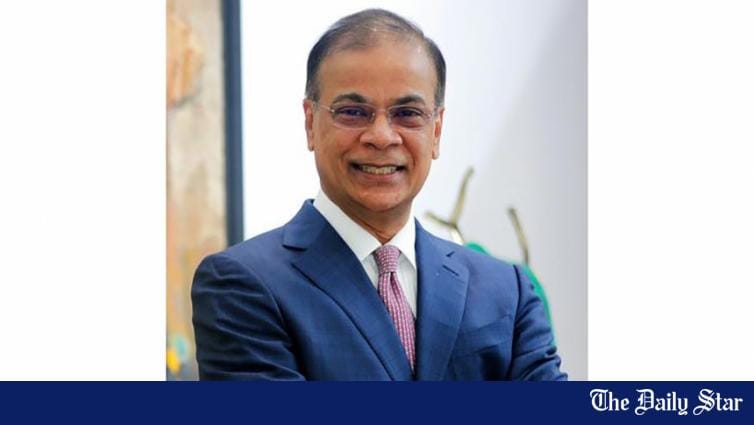Saifuzzaman Chy owns over 350 properties in UK
Reports Bloomberg News

Land Minister Saifuzzaman Chowdhury
Former land minister Saifuzzaman Chowdhury has built up a UK real estate empire of more than 350 properties worth about £200 million, Bloomberg News reported on Sunday.
The figures were based on a Bloomberg analysis of available Companies House corporate accounts in the UK, mortgage charges and HM Land Registry transactions.
Saifuzzaman properties range from luxury apartments in central London to housing in Tower Hamlets -- home to the largest Bangladeshi community in England -- and student accommodation in Liverpool.
The international news agency headquartered in New York City analysed nearly 250 of his UK properties and found that almost 90 percent were classified as new-builds when bought, a valuable component in a UK housing market suffering severe shortages.
These transactions took place during a period when the UK government had committed to making foreign property ownership more transparent amid criticism of the ease with which Russian oligarchs were able to hide their wealth in the UK. This process became more urgent in the wake of Moscow's 2022 invasion of Ukraine.
His property deals could revive questions over whether UK's legislation to scrutinise such purchases involving politicians are effective, according to transparency advocates.
Bloomberg also identified at least five properties in Manhattan in the USA belonging to Saifuzzaman, bought for a total of about $6 million between 2018 and 2020, according to municipal property records.
He was re-elected as an MP, but lost his cabinet post after the January 7 national election, which was boycotted by the opposition after anti-government protests were violently put down. He has since become the chair of the parliamentary committee for land.
On December 29 last year, The Daily Star ran a report on Saifuzzaman's properties in the UK. Based on the newspaper's calculation from company filings publicly available on UK government websites, it found at least 260 properties in the UK, for which he has paid at least GBP 134.76 million or Tk 1,888 crore.
The three-time AL lawmaker also has at least 537 mortgages against properties in the UK, a vast majority of which are in London. However, his tax returns, submitted along with his affidavit to the Election Commission, states that he has no foreign income, The Daily Star reported.
The Bloomberg report said that in a pre-election declaration of his interests in December, Saifuzzaman listed his total assets at about Tk 258.3 million ($2.4 million), and those of his wife, Rukhmila Zaman, at about $993,000. He did not include his UK property holdings in the declaration of assets in Bangladesh. His 2022-23 salary as a minister of state is listed as about £10,000.
Bloomberg talked to Mezbaul Haque, a Bangladesh Bank spokesperson, who without commenting specifically on Saifuzzaman, said, "While residing in Bangladesh, there is no provision for an individual to accumulate wealth abroad…. As a general rule, we do not permit individuals to do so."
Saifuzzaman falls into the category of a "politically exposed person (PEP)," as defined in the UK's 2017 anti-money laundering legislation. It puts the onus on estate agents, lenders, property lawyers and others involved in business transactions in the UK to have procedures in place to identify PEPs.
Although these individuals can engage in business transactions such as buying property, their involvement should attract extra scrutiny.
Bloomberg approached the companies named in its story, including financial services and legal firms involved in the property purchases for the Chowdhury-owned companies. The firms that responded said relevant procedures had been followed. They, however, could not provide an elaborate comment due to concerns over commercial confidentiality.
The Daily Star made several phone calls to Saifuzzaman yesterday but found his mobile phone switched off. A text message was also sent to his number, but no response came.
Bloomberg also did not get any response from the former minister and his wife to requests for comments on his property holdings outside Bangladesh or his asset declaration.
On December 26 last year, Transparency International Bangladesh (TIB), at a press conference, first raised the issue of a minister's business abroad worth over Tk 203 billion.
TIB did not disclose the name of the minister, but the anti-graft body said if any government authorities seek the information, they are ready to provide evidence.
Land Minister Saifuzzaman Chowdhury
Former land minister Saifuzzaman Chowdhury has built up a UK real estate empire of more than 350 properties worth about £200 million, Bloomberg News reported on Sunday.
The figures were based on a Bloomberg analysis of available Companies House corporate accounts in the UK, mortgage charges and HM Land Registry transactions.
Saifuzzaman properties range from luxury apartments in central London to housing in Tower Hamlets -- home to the largest Bangladeshi community in England -- and student accommodation in Liverpool.
The international news agency headquartered in New York City analysed nearly 250 of his UK properties and found that almost 90 percent were classified as new-builds when bought, a valuable component in a UK housing market suffering severe shortages.
These transactions took place during a period when the UK government had committed to making foreign property ownership more transparent amid criticism of the ease with which Russian oligarchs were able to hide their wealth in the UK. This process became more urgent in the wake of Moscow's 2022 invasion of Ukraine.
His property deals could revive questions over whether UK's legislation to scrutinise such purchases involving politicians are effective, according to transparency advocates.
Bloomberg also identified at least five properties in Manhattan in the USA belonging to Saifuzzaman, bought for a total of about $6 million between 2018 and 2020, according to municipal property records.
He was re-elected as an MP, but lost his cabinet post after the January 7 national election, which was boycotted by the opposition after anti-government protests were violently put down. He has since become the chair of the parliamentary committee for land.
On December 29 last year, The Daily Star ran a report on Saifuzzaman's properties in the UK. Based on the newspaper's calculation from company filings publicly available on UK government websites, it found at least 260 properties in the UK, for which he has paid at least GBP 134.76 million or Tk 1,888 crore.
The three-time AL lawmaker also has at least 537 mortgages against properties in the UK, a vast majority of which are in London. However, his tax returns, submitted along with his affidavit to the Election Commission, states that he has no foreign income, The Daily Star reported.
The Bloomberg report said that in a pre-election declaration of his interests in December, Saifuzzaman listed his total assets at about Tk 258.3 million ($2.4 million), and those of his wife, Rukhmila Zaman, at about $993,000. He did not include his UK property holdings in the declaration of assets in Bangladesh. His 2022-23 salary as a minister of state is listed as about £10,000.
Bloomberg talked to Mezbaul Haque, a Bangladesh Bank spokesperson, who without commenting specifically on Saifuzzaman, said, "While residing in Bangladesh, there is no provision for an individual to accumulate wealth abroad…. As a general rule, we do not permit individuals to do so."
Saifuzzaman falls into the category of a "politically exposed person (PEP)," as defined in the UK's 2017 anti-money laundering legislation. It puts the onus on estate agents, lenders, property lawyers and others involved in business transactions in the UK to have procedures in place to identify PEPs.
Although these individuals can engage in business transactions such as buying property, their involvement should attract extra scrutiny.
Bloomberg approached the companies named in its story, including financial services and legal firms involved in the property purchases for the Chowdhury-owned companies. The firms that responded said relevant procedures had been followed. They, however, could not provide an elaborate comment due to concerns over commercial confidentiality.
The Daily Star made several phone calls to Saifuzzaman yesterday but found his mobile phone switched off. A text message was also sent to his number, but no response came.
Bloomberg also did not get any response from the former minister and his wife to requests for comments on his property holdings outside Bangladesh or his asset declaration.
On December 26 last year, Transparency International Bangladesh (TIB), at a press conference, first raised the issue of a minister's business abroad worth over Tk 203 billion.
TIB did not disclose the name of the minister, but the anti-graft body said if any government authorities seek the information, they are ready to provide evidence.






































